| Office | Nominee | Assumed office | left office |
|---|

Attorney General |

William Barr [1] | February 14, 2019
(Confirmed February 14, 2019, 54–45) [RC1 1] | December 23, 2020 |
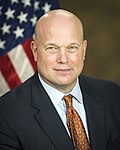
Matthew Whitaker | November 7, 2018 | February 14, 2019 |

Jeff Sessions | February 8, 2017
(Confirmed February 8, 2017, 52–47) [RC1 2] | November 7, 2018 |

Deputy Attorney General | 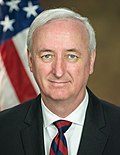
Jeffrey A. Rosen | May 22, 2019
(Confirmed May 16, 2019, 52–45) [RC1 3] | January 20, 2021 |

Rod Rosenstein | April 26, 2017
(Confirmed April 25, 2017, 94–6) [RC1 4] | May 11, 2019 |

Associate Attorney General | 
Claire McCusker Murray | May 14, 2019 | January 20, 2021 |

Jesse Panuccio | February 21, 2018 | May 3, 2019 |

Rachel Brand | May 22, 2017
(Confirmed May 18, 2017, 52–46) [RC1 5] | February 20, 2018 |

Solicitor General | Jeff Wall | July 3, 2020 | January 20, 2021 |
| March 10, 2017 | September 19, 2017 |

Noel Francisco | September 19, 2017
(Confirmed September 19, 2017, 50–47) [RC1 6] | July 3, 2020 |
| January 23, 2017 | March 10, 2017 |
|

Assistant Attorney General
(Antitrust Division) | 
Makan Delrahim [2] | September 28, 2017
(Confirmed September 27, 2017, 73–21) [RC1 7] | January 20, 2021 |

Assistant Attorney General
(Civil Division) | 
Ethan P. Davis | July 4, 2020 | September 11, 2020 |
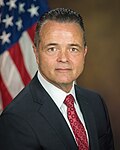
Jody Hunt | September 4, 2018
(Confirmed August 28, 2017, 72–23) [RC1 8] | July 3, 2020 |

Assistant Attorney General
(Civil Rights) | 
Eric Dreiband | October 12, 2018
(Confirmed October 11, 2018, 50–47) [RC1 9] | January 8, 2021 |

Assistant Attorney General
(Criminal Division) | 
Brian Rabbitt | July 3, 2020 | December 24, 2020 |

Brian Benczkowski | July 16, 2018
(Confirmed July 11, 2018, 51–48) [RC1 10] | July 3, 2020 |

Assistant Attorney General
(Environment and Natural Resources Division) | 
Jeffrey Clark | November 1, 2018
(Confirmed October 11, 2018, 52–45) [RC1 11] | January 21, 2021 |
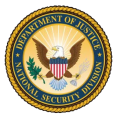
Assistant Attorney General
(National Security Division) | 
John Demers [3] | February 22, 2018
(Confirmed February 15, 2018, voice vote) [V1 1] | January 20, 2021 |

Assistant Attorney General
(Tax Division) | Richard E. Zuckerman | Nomination lapsed and returned to the President on January 3, 2021 [4] |
| 2017 | 2021 |

Assistant Attorney General
(Office of Legal Counsel) | 
Steven Engel [5] | November 13, 2017
(Confirmed November 7, 2017, 51–47) [RC1 12] | January 20, 2021 |

Assistant Attorney General
(Office of Legal Policy) | 
Beth Ann Williams | August 21, 2017
(Confirmed August 3, 2017, voice vote) [V1 2] | December 11, 2020 |

Assistant Attorney General
(Office of Legislative Affairs) | 
Stephen Boyd | September 5, 2017
(Confirmed August 3, 2017, voice vote) [V1 3] | January 20, 2021 |
| Bureau of Alcohol, Tobacco, Firearms and Explosives |
|---|
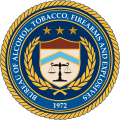
Director of the Bureau of Alcohol, Tobacco, Firearms and Explosives | 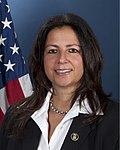
Regina Lombardo | May 1, 2019 | June 3, 2021 |

Kenneth Charles Canterbury Jr. | Nomination withdrawn by the President on February 28, 2017 [6] |
| Federal Bureau of Investigation |
|---|

Director of the Federal Bureau of Investigation | 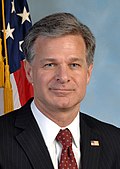
Christopher A. Wray [7] | August 2, 2017
(Confirmed August 1, 2017, 92–5) [RC1 13] | January 19, 2025 |
| Federal Bureau of Prisons |
|---|

Director of the Federal Bureau of Prisons |

Kathleen Hawk Sawyer | August 19, 2019 | February 25, 2020 |
| Hugh Hurwitz | May 2018 | August 19, 2019 |

Mark Inch | September 18, 2017 | May 18, 2018 |

Member of the Board of Directors of the Federal Prison Industries | 
Deline R. Reardon [8] | March 5, 2018 | |
| Office of Justice Programs |
|---|

Assistant Attorney General
(Office of Justice Programs) | Katharine Sullivan | Nomination lapsed and returned to the President on January 3, 2021 [9] |
| June 2019 | January 20, 2021 |

Laura Rogers | July 2018 | October 2018 |

Director of the Bureau of Justice Assistance | Jon Adler [10] | December 11, 2017
(Appointed September 15, 2017) | September 16, 2019 |

Director of the Bureau of Justice Statistics | Jeffrey H. Anderson | November 2017 | January 20, 2021 |

Director of the National Institute of Justice | 
David B. Muhlhausen [11] [12] | August 22, 2017
(Appointed July 11, 2017) | January 20, 2021 |

Director of the Office for Victims of Crime | 
Darlene Hutchinson Biehl [13] | August 14, 2017
(Appointed July 1, 2017) | December 2019 |

Administrator of the Office of Juvenile Justice and Delinquency Prevention | 
Caren Harp [14] | January 19, 2018
(Appointed December 18, 2017) | January 20, 2021 |

Director of the Office of Sex Offender Sentencing, Monitoring, Apprehending, Registering, and Tracking | 
Laura Rogers | January 4, 2018
(Appointed October 5, 2017) | July 2019 |
| Office on Violence Against Women |
|---|

Director of the Office of Violence Against Women | 
Laura Rogers | July 2019 | January 2021 |
| Foreign Claims Settlement Commission |
|---|

Member of the Foreign Claims Settlement Commission | Patrick Hovakimian [15] | June 4, 2018
(Confirmed May 10, 2018, voice vote) [V1 4] | |
| United States Marshals Service |
|---|

Director of the United States Marshals Service | 
Donald W. Washington | March 29, 2019
(Confirmed March 14, 2018, voice vote) [V1 5] | September 27, 2021 |

Director of Community Relations Service | Gerri Ratliff | June 15, 2018 | May 2022 |
| Drug Enforcement Administration |
|---|

Administrator of the Drug Enforcement Administration | 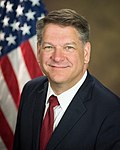
Timothy Shea | May 19, 2020 | January 20, 2021 |

Uttam Dhillon | July 2, 2018 | May 18, 2020 |

Robert W. Patterson | October 1, 2017 | July 2, 2018 |













































































